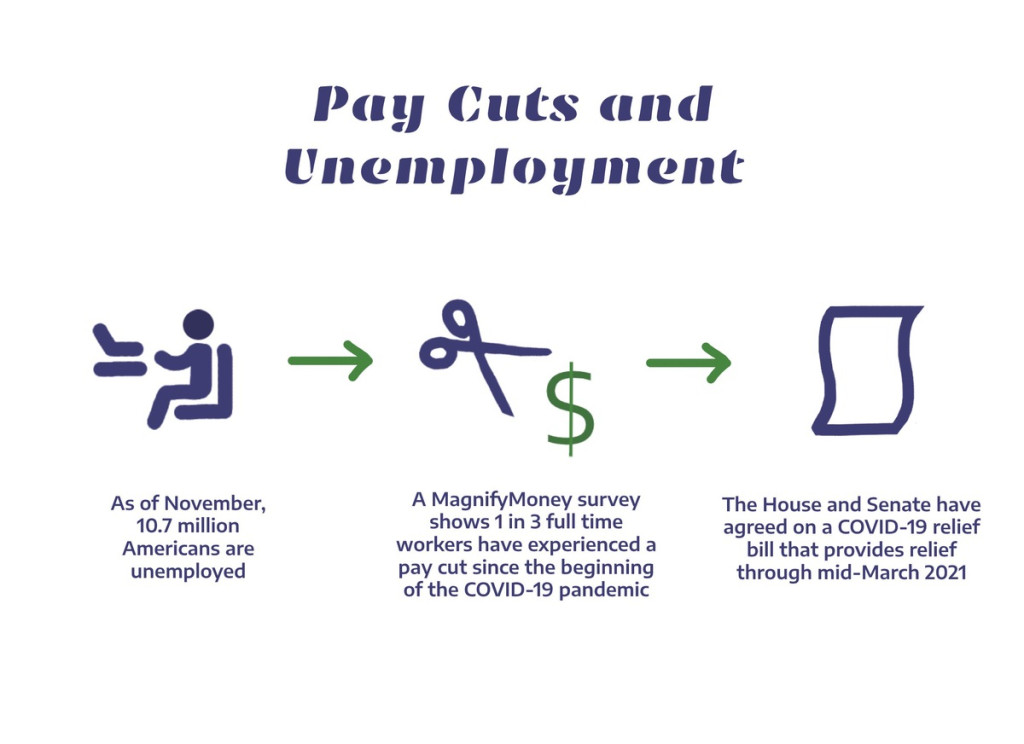Like millions of Americans, Chris Ingersoll was laid off when the pandemic hit. Prior to COVID-19, Ingersoll worked in healthcare technology at a company called R1 RCM that managed financial operations for hospitals. The company’s income was directly tied to hospitals and, surprisingly enough, the pandemic’s effect on hospital revenue wasn’t entirely positive. Much of the hospital’s income came from elective procedures and surgeries that were shut down due to COVID-19, which led to about 20 percent of R1 RCM being laid off — Ingersoll among them.
Ingersoll’s story is one that has unfolded repeatedly across the country. Throughout the COVID-19 pandemic, many aspects of life have changed, but some of the most lasting and damaging effects of the pandemic have been on the economy. The shutdowns and financial losses that have arisen alongside COVID-19 have created a financial crisis that experts at the World Economic Forum consider to be three times worse than the 2008 financial crisis.
At the onset of the pandemic in the United States in early 2020, over 22.2 million jobs were lost and, although dropping case numbers and reopened businesses have allowed jobs to rehire, many still remain unemployed. According to the US Department of Labor Statistics, as of November, 10.7 million Americans are unemployed — a number that has continued to trend down since its high in April, but is still 4.9 million higher than in February. Across the East Bay, the unemployment rate has dropped to 6.9 percent and, across San Francisco, the rate is at 5.7 percent.
Ingersoll has since been able to find another job, but he reflected on COVID-19’s effect, saying, “COVID has severely affected many industries, and I know a lot of people weren’t as fortunate as I was and were unable to find another job. Looking at most of the service-centered industries, it’s very difficult in many cases because people and customers are unable to come in. It’s a dramatic adjustment.”

One of the industries most affected by the economic impact of COVID-19 has been the restaurant and food service industry. With shutdowns and the spotlight on public health influencing restaurant’s access to storefronts and customers, many restaurants were forced to considerably downsize or even close permanently. On top of all the struggles that come with running a business during a pandemic, the food industry experienced a specific lack of interest, due to questions surrounding safety and necessity.
Mia Redmond, a Berkeley High School (BHS) senior in Communication Arts and Sciences (CAS), experienced the pandemic’s effect on restaurants firsthand. She previously worked at I Scream Donuts, an ice cream and donut shop in Oakland, but when the shutdown came into effect, their storefront was temporarily closed. The majority of customers came from passerby traffic, so without outdoor dining, the cost of staying open didn’t make sense and all of their workers were temporarily fired.
Redmond said, “It’s affected my sense of stability, and I assume they’re going to reopen, but you never know for sure. There’s such a sense of unknown about the future.”
Reena Rongstock-Kramer, a junior in Berkeley International High School (BIHS), has also experienced the volatility of working during COVID-19. She worked at Anastasia’s, a vintage clothing store in Berkeley and, amidst the confusion of staffing throughout the pandemic, the business over-hired, forcing her and other long-term employees to temporarily stop working. Communication has been a consistent issue at her job and, prior to the pandemic, she was actually searching for other work.
She stated, “I was already looking for a new job before COVID, and kept it up when things were improving, but now because of the second wave, I’m unable to keep searching and am stuck without work.”
Finding work, or even returning to employment at places shut down by the pandemic, is a major challenge for people and stretches even beyond restaurants and businesses. Shira Burns, a BHS senior in Academic Choice (AC), was forced to stop working at the preschool of her temple, Temple Beth Hillel, after it was shut down in March. The shutdown put many people out of work, including full-time employees, and although they’re providing online services, the doors still remain closed.
Burns considers one of the worst consequences of raised unemployment numbers to be its effects on homelessness. She stated, “For many people who go through unemployment, it leads to eviction, and in California, we already have such a big homelessness crisis that’s just being worsened by COVID.”
As high school students, Redmond, Rongstock-Kramer, and Burns were working to save for the future, which does place them in a different position from those working to support themselves or their families. Despite Burns’ awareness of COVID-19’s effect on homelessness, the fear of eviction or being able to provide for herself isn’t a major issue for her. However, finding a way to pay rent and put food on the table is a very real problem that many individuals and families dealing with unemployment have to face. Because of this, the government has finally moved forward with a coronavirus relief bill partially focusing on benefits for the unemployed.
As of December 20, the House and Senate came to an agreement surrounding a $900 billion coronavirus relief bill that will provide relief through mid-March of 2021. It involves an 11-week extension of the unemployment insurance compensation benefits that were first provided by the CARES Act, as well as a second round of stimulus checks for individuals.
With the government’s support and an increase in funding for relief packages, improving unemployment rates seems like a much more feasible task. Although rebuilding the economy will take time, many experts believe that the worst has passed and that jobs and economic standing will only improve.
As Redmond said, “With COVID, there isn’t much you can do but look forward and be hopeful.”
Disclaimer: Chris Ingersoll is related to a Jacket editor.





